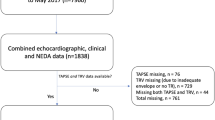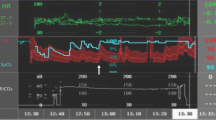Abstract
Pericardiocentesis is performed to treat cardiac tamponade or diagnose the cause of pericardial effusion. Cardiogenic shock with right ventricular (RV) dysfunction is a rare complication after pericardiocentesis. We report a case of an 82-year-old man who suddenly suffered cardiopulmonary arrest 12 h after pericardiocentesis. A transthoracic echocardiogram showed remarkable RV dysfunction and tricuspid valve dysfunction. Tricuspid valve closure was severely impaired, and the tricuspid regurgitation signal showed laminar flow with an early peak. However, after treatment with high-dose inotropic drugs, hemodynamic parameters gradually recovered. A transthoracic echocardiogram performed 24 h later showed improved motion of the RV and the tricuspid valve, resulting in a reduction in tricuspid regurgitation. RV and tricuspid valve dysfunction after pericardiocentesis needs to be recognized as a critical complication. Physicians also need to pay attention to not only the amount of drainage but also underlying RV dysfunction.



Similar content being viewed by others
References
Sunday R, Robinson LA, Bosek V. Low cardiac output complicating pericardiectomy for pericardial tamponade. Ann Thorac Surg. 1999;67:228–31.
Anguera I, Paré C, Perez-Villa F. Severe right ventricular dysfunction following pericardiocentesis for cardiac tamponade. Int J Cardiol. 1997;59:212–4.
Viola AR. The influence of pericardiectomy on the hemodynamics of chronic constrictive pericarditis. Circulation. 1973;48:1038–42.
Armstrong WF, Feigenbaum H, Dillon JC. Acute right ventricular dilation and echocardiographic volume overload following pericardiocentesis for relief of cardiac tamponade. Am Heart J. 1984;107:1266–70.
Manyari DE, Kostuk WJ, Purves P. Effect of pericardiocentesis on right and left ventricular function and volumes in pericardial effusion. Am J Cardiol. 1983;52:159–62.
Dosios T, Theakos N, Angouras D, et al. Risk factors affecting the survival of patients with pericardial effusion submitted to subxiphoid pericardiostomy. Chest. 2003;124:242–6.
Author information
Authors and Affiliations
Corresponding author
Ethics declarations
Conflict of interest
None declared.
Ethical statements
All procedures followed were in accordance with the ethical standards of the responsible committee on human experimentation (institutional and national) and with the Helsinki Declaration of 1975, as revised in 2008. Informed consent was obtained from the patient included in the study.
About this article
Cite this article
Kuroda, M., Amano, M., Enomoto, S. et al. Severe right ventricular and tricuspid valve dysfunction after pericardiocentesis. J Med Ultrasonics 43, 533–536 (2016). https://doi.org/10.1007/s10396-016-0738-5
Received:
Accepted:
Published:
Issue Date:
DOI: https://doi.org/10.1007/s10396-016-0738-5




